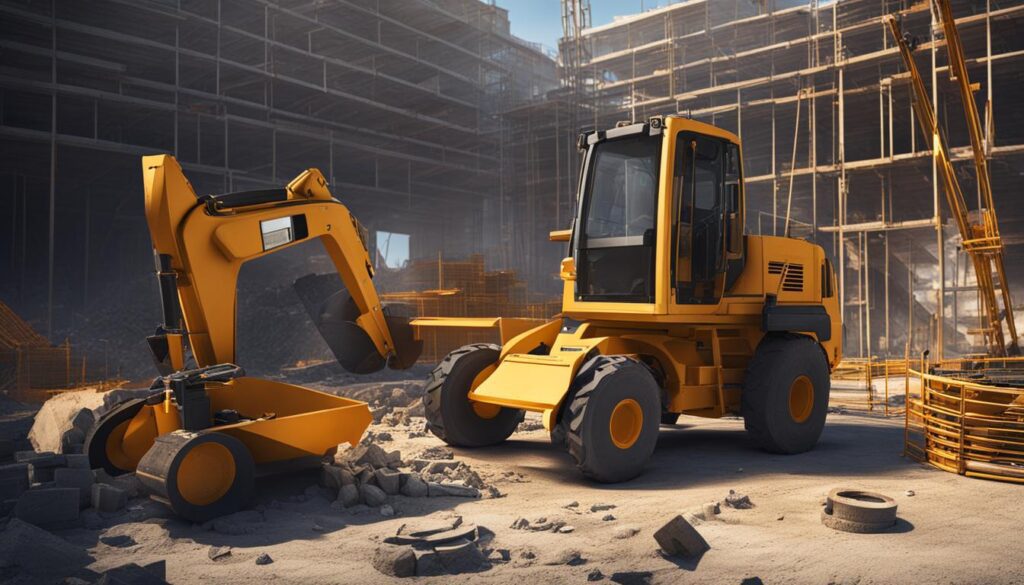As a construction company, maintaining healthy cash reserves is critical to ensuring a stable and thriving business. Having enough cash on hand can be the difference between surviving a sudden economic downturn or weathering an unexpected delay in project completion.
But how much cash should a construction company have on hand to maintain financial stability and support ongoing operations? In this section, we will explore the importance of cash reserves for construction companies and the recommended amount of cash they should maintain to mitigate financial risks and secure their future.
Key Takeaways
- Cash reserves are essential for construction companies to maintain a healthy business and financial stability.
- The recommended amount of cash reserves a construction company should have on hand depends on various factors, such as project size, seasonality, industry trends, and risk tolerance.
- Effective strategies, such as optimizing cash flow and reducing overhead costs, can help construction companies build and maintain healthy cash reserves.
- Having adequate cash reserves can provide construction companies with numerous benefits, such as increased borrowing capacity and the ability to seize investment opportunities.
- To effectively manage cash reserves, construction companies should follow best practices, such as maintaining a cash reserve policy and seeking professional financial advice.
Why are cash reserves essential for construction companies?
Construction companies operate in a highly competitive and often unpredictable industry, which makes having adequate cash reserves critical for financial stability and long-term success. Without proper cash reserves, construction companies may struggle to manage cash flow fluctuations, cover unexpected expenses or emergencies, and finance new projects.
One of the primary reasons why cash reserves are so crucial for construction companies is that the industry is heavily reliant on project-based revenue. This means that income can be irregular and unpredictable, making it difficult to maintain a steady cash flow and plan for the future.
Furthermore, due to the nature of construction projects, unexpected expenses can arise at any time. For example, a project may encounter unexpected delays or require additional materials, causing costs to exceed the initial budget. Without sufficient cash reserves, construction companies may be forced to take on debt or delay projects, which can hurt their reputation and financial stability.
By maintaining healthy cash reserves, construction companies can ensure they have the financial flexibility to weather unexpected events, smooth out cash flow fluctuations, and pursue new opportunities as they arise.
Key benefits of having cash reserves in the construction industry
The benefits of having adequate cash reserves in the construction industry are numerous and include:
- Improved financial stability
- Increased borrowing capacity
- Ability to seize investment opportunities
- Enhanced business reputation
Having healthy cash reserves can also help construction companies mitigate financial risks and protect themselves against economic downturns and other external factors that may impact their business.
“Having cash reserves gives construction companies the financial flexibility they need to weather unexpected events and pursue new opportunities as they arise.”
Factors to Consider When Determining the Ideal Cash Reserves for a Construction Company
Determining the ideal amount of cash reserves for a construction company requires careful consideration of various factors. Financial planning is crucial in ensuring the company has enough cash on hand to maintain a healthy business and weather financial storms. Here are some factors to consider:
- Project size: The size of a construction project can significantly impact a company’s cash reserves. Smaller projects may require less cash on hand, while larger, more complex projects may require more upfront investment.
- Seasonality: Seasonal fluctuations can impact a construction company’s financial stability. During slower months, a company may need to dip into their reserves to cover expenses and maintain cash flow.
- Industry trends: Keeping up with industry trends is essential in determining cash reserves. A company that’s slow to adapt to changes in the industry may find themselves struggling financially.
- Risk tolerance: Every construction company has a different level of risk tolerance. Some companies may prefer to keep more cash on hand to mitigate financial risks, while others may be comfortable with less.
Comparing Cash Reserves for Different Project Sizes
| Project Size | Recommended Cash Reserves |
|---|---|
| Small (under $50,000) | $5,000 – $10,000 |
| Medium ($50,000 – $250,000) | $20,000 – $50,000 |
| Large (over $250,000) | $50,000 – $100,000 |
These are general recommendations and may vary depending on a company’s specific circumstances and risk tolerance.
By taking these factors into account, a construction company can determine the ideal amount of cash reserves to maintain financial stability and keep their business thriving.
How to Calculate the Recommended Cash Reserves for a Construction Company
The amount of cash reserves that a construction company should maintain depends on various factors, including monthly expenses, project backlog, working capital needs, and potential risks. Calculating the recommended cash reserves requires a careful financial analysis of the company’s financial position and potential future cash needs.
Here are some practical steps construction companies can follow to determine the ideal amount of cash reserves:
- Calculate the company’s monthly operating expenses. This includes all regular expenses such as payroll, utilities, rent, insurance, and any other expenses necessary to run the business on a month-to-month basis.
- Determine the company’s average project backlog. This refers to the number of projects the company has in progress or contracted but not yet started. It is essential to have enough cash reserves to cover the costs of completing these projects, even if payments from clients are delayed.
- Evaluate the company’s working capital needs. Working capital is the amount of money needed to cover short-term operating expenses, such as purchasing materials or paying subcontractors, while waiting for payments from clients. The recommended amount of working capital will vary depending on the size and complexity of the company’s projects.
- Assess potential risks and unexpected expenses. Construction companies face various risks, such as project delays, supplier bankruptcies, and natural disasters, that can have a significant impact on their cash flow. It is crucial to have enough cash reserves to handle unexpected expenses that can arise in the course of doing business.
Once construction companies have a clear understanding of their monthly expenses, project backlog, working capital needs, and potential risks, they can calculate the recommended amount of cash reserves to maintain. A general rule of thumb is that a construction company should have enough cash reserves to cover at least three months of operating expenses.
However, the optimal amount of cash reserves will vary depending on the factors discussed above and the company’s risk tolerance. Some companies may choose to maintain a higher level of cash reserves to mitigate risks, while others may prefer to invest more of their cash into expansion or other business opportunities.
“By carefully evaluating their financial position and potential risks, construction companies can develop a sound cash reserve strategy that will help ensure their long-term financial stability.”
Strategies to build and maintain cash reserves in the construction industry
Building and managing healthy cash reserves is crucial to ensuring financial stability and success in the construction business. Here are some effective strategies construction companies can implement to build and maintain their cash reserves:
- Optimize cash flow: This involves monitoring and managing cash inflows and outflows, negotiating favorable payment terms, incentivizing early payments, and reducing payment delays to maximize cash inflow.
- Reduce overhead costs: This involves identifying and eliminating unnecessary or excessive expenses, such as equipment rentals that are not in use, minimizing overtime costs, and reducing energy and utility bills.
- Negotiate favorable payment terms: This involves negotiating with suppliers and subcontractors to extend payment terms, allowing the company to hold onto cash for longer periods.
- Create a budgeting and savings plan: Establishing a budget and savings plan allows the company to allocate funds to strategic areas, such as emergency funds, expansion plans, or new equipment purchases.
Implementing these strategies can help construction companies build and maintain healthy cash reserves, providing them with financial flexibility, stability, and security.

The Benefits of Having Adequate Cash Reserves for a Construction Company
Construction companies with adequate cash reserves enjoy numerous benefits that enable them to achieve financial security and stability. Some of the top benefits of having cash reserves include:
- Improved financial security and the ability to withstand economic downturns.
- Increased borrowing capacity, which can be crucial when pursuing high-risk projects or investments.
- The ability to seize investment opportunities that arise in the market.
- Enhanced business reputation, as a company with healthy financials is perceived as more trustworthy and reliable by clients, partners, and investors.
Overall, maintaining adequate cash reserves is critical for construction companies to sustain their business operations over the long term and ensure financial security.
“Construction companies with healthy cash reserves are better positioned to weather economic uncertainties and capitalize on growth opportunities, making them more attractive to investors.”
As a highly competitive and cyclical industry, the construction sector is fraught with financial risks and uncertainties. Companies that fail to maintain healthy cash reserves are more vulnerable to financial shocks, including project cost overruns, payment delays, and economic downturns, which can lead to bankruptcy or insolvency.
Therefore, constructing a sound financial plan that emphasizes cash reserves is a critical component of any construction business strategy, enabling companies to grow and thrive even when faced with significant economic challenges.
Common challenges faced when managing cash reserves in the construction industry
While maintaining healthy cash reserves is critical to the success of any construction business, managing these reserves can pose significant challenges. Here are some of the most common challenges construction companies face when managing their cash reserves:
- Cash flow volatility: Unpredictable fluctuations in cash flow can make it challenging to maintain adequate reserves. Construction companies often face irregular payment schedules, which can create a feast or famine situation where cash surpluses are quickly depleted, leaving the company vulnerable to unexpected expenses or cash flow shortages.
- Unexpected project delays: Delays in construction projects can have a ripple effect on cash reserves, leading to increased expenses and revenue loss. Construction companies must be prepared for unforeseen delays, ensuring they have enough cash reserves to cover the costs of extended delays.
- Economic downturns: A recession or economic downturn can have a significant impact on a construction company’s cash reserves. Reduced demand for construction services, coupled with increased competition and decreased access to financing, can lead to cash flow shortages and a drain on reserves.
- The temptation to misuse available funds: In addition to external challenges, construction companies must be mindful of internal risks. The availability of cash reserves can be tempting, leading some business owners to dip into these funds for non-essential expenses or personal use, potentially compromising the company’s financial stability.
To mitigate these challenges, construction companies must implement sound financial planning and risk management practices, staying vigilant and proactive in maintaining healthy reserves.

Best Practices for Effectively Utilizing Cash Reserves in the Construction Industry
Utilizing cash reserves is a crucial aspect of financial decision-making for construction businesses. Here are some best practices to follow to ensure that cash reserves are used effectively:
- Establish a cash reserve policy: It is essential to have a policy in place that outlines how cash reserves can be used, who is authorized to access them, and under what circumstances they can be used. This policy should be regularly reviewed and updated as necessary.
- Make informed financial decisions: When using cash reserves, it is important to ensure that the decision aligns with the company’s financial goals and long-term strategy. All financial decisions should be made after careful analysis and consideration of their potential impact on the company’s financial position.
- Regularly review and adjust reserve levels: Cash reserves should be regularly reviewed to ensure they are adequate given current market conditions and the company’s financial needs. Adjustments should be made as necessary to maintain an appropriate level of reserves.
- Seek professional financial advice: Construction companies can benefit from seeking the advice of financial professionals when making important financial decisions or managing their cash reserves. This advice can help ensure that all financial aspects of the business are handled wisely and strategically.
By following these best practices, construction companies can maximize the benefits of their cash reserves and make the most informed financial decisions for their business.
Conclusion
It is clear that maintaining healthy cash reserves is essential for the success of construction companies. By having adequate cash on hand, companies can mitigate financial risks, weather economic downturns, and capitalize on investment opportunities.
Construction companies should carefully consider a variety of factors, such as project size, seasonality, industry trends, and risk tolerance, when determining the ideal amount of cash reserves to maintain. By calculating recommended reserve levels and implementing effective cash management strategies, companies can build and maintain healthy cash reserves.
However, managing cash reserves can pose some challenges, such as cash flow volatility and unexpected expenses. Companies should follow best practices when utilizing their cash reserves, including maintaining a reserve policy, making informed financial decisions, and seeking professional financial advice.
Overall, construction companies that prioritize building and maintaining adequate cash reserves can ensure their financial security and long-term success in the industry.
FAQ
How much cash should a construction company have on hand?
The recommended amount of cash reserves for a construction company may vary depending on several factors, such as the size of projects, seasonality, industry trends, and risk tolerance. It is generally advisable to have enough cash on hand to cover at least three to six months of operating expenses.
Why are cash reserves essential for construction companies?
Cash reserves are crucial for construction companies to ensure financial stability, manage cash flow fluctuations, and be prepared for unexpected expenses or emergencies. They provide a safety net that allows businesses to continue operations during challenging times and avoid disruptions.
What factors should be considered when determining the ideal cash reserves for a construction company?
Construction companies should consider various factors when determining the optimal amount of cash reserves, including project size, seasonality, industry trends, and the company’s risk tolerance. It is important to balance the need for liquidity with the potential risks and opportunities in the business environment.
How can a construction company calculate the recommended cash reserves?
Construction companies can calculate the recommended amount of cash reserves by assessing their monthly expenses, project backlog, working capital needs, and potential risks. It is advisable to conduct a thorough financial analysis and seek professional guidance to determine an appropriate reserve level.
What strategies can construction companies use to build and maintain cash reserves?
Construction companies can implement several strategies to build and maintain healthy cash reserves. These include optimizing cash flow by improving invoicing and payment processes, reducing overhead costs, negotiating favorable payment terms with clients, and creating a budgeting and savings plan.
What are the benefits of having adequate cash reserves for a construction company?
Having adequate cash reserves provides construction companies with improved financial security, increased borrowing capacity, the ability to seize investment opportunities, and an enhanced business reputation. Cash reserves help businesses navigate economic uncertainties and withstand unexpected challenges.
What are some common challenges in managing cash reserves in the construction industry?
Construction companies may face challenges such as cash flow volatility, unexpected project delays, economic downturns, and the temptation to misuse available funds. It is important to have strong financial management practices in place to effectively manage and protect cash reserves.
What are the best practices for effectively utilizing cash reserves in the construction industry?
Construction companies should follow best practices such as maintaining a cash reserve policy, making informed financial decisions, regularly reviewing and adjusting reserve levels based on business needs, and seeking professional financial advice when necessary. These practices help ensure the effective utilization of cash reserves.
How can cash reserves contribute to the long-term success of a construction company?
Cash reserves contribute to the long-term success of a construction company by safeguarding financial stability, providing a buffer for unexpected expenses, and enabling the company to make strategic investments or expansions. They enhance the company’s ability to weather economic downturns and sustain growth.



